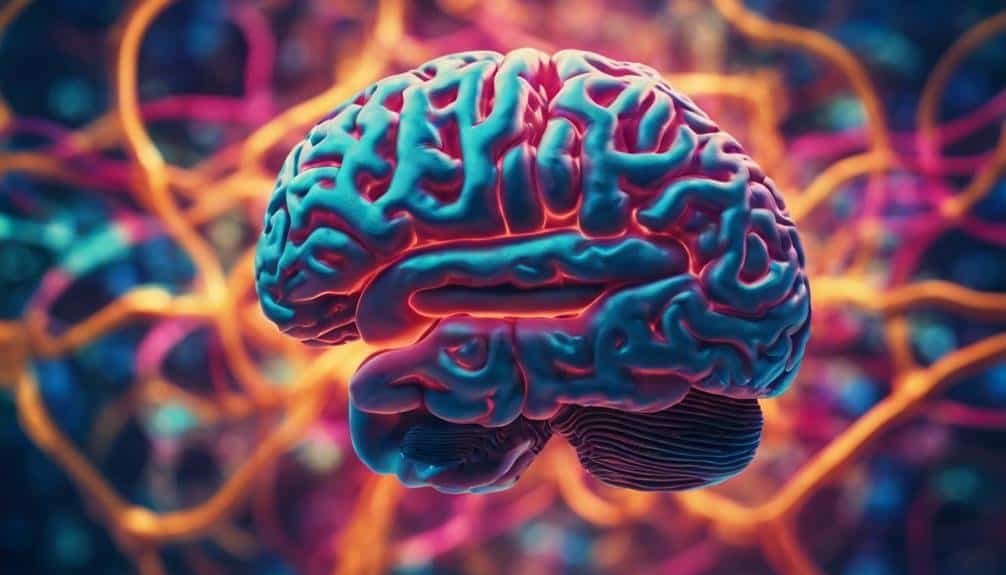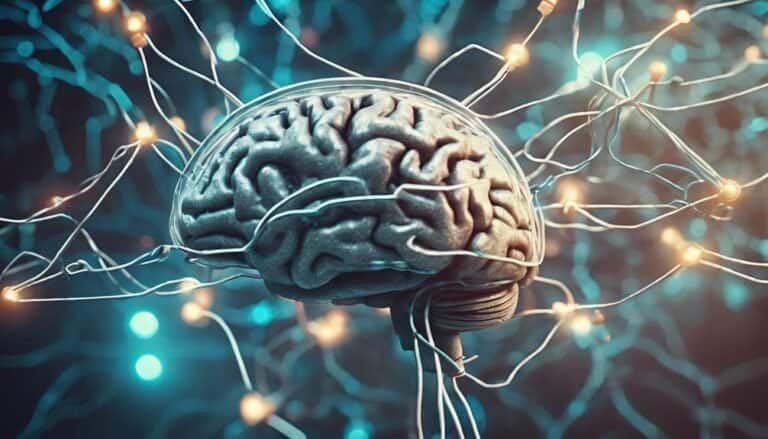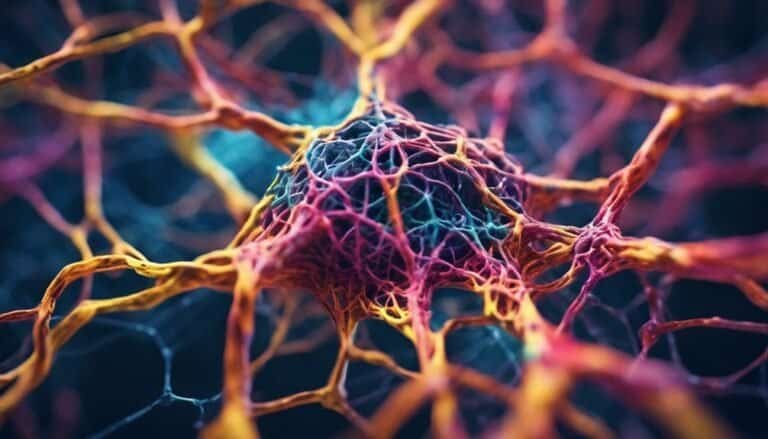Brain and Body Connection in Wellness
Have you ever pondered the intricate relationship between your brain and body in maintaining overall wellness?
The interconnectedness of these two vital components of your being holds a key to understanding the holistic nature of health. Exploring how your thoughts, emotions, and physical well-being are deeply intertwined can provide insightful avenues towards enhancing your overall quality of life.
In the realm of wellness, uncovering the profound impacts of this brain-body connection may offer a transformative perspective on how you approach your health journey.
Key Takeaways
- Stress impacts overall health through brain-body interaction.
- Emotional well-being influences immune function and wellness.
- Techniques like meditation and mindfulness enhance immune support.
- Holistic wellness integrates mental and physical health for optimal well-being.
Stress Response Mechanisms
Understanding how the brain and body interact during stress is crucial for comprehending the intricate mechanisms of the stress response. When faced with a perceived threat, the body initiates the well-known fight or flight response. This evolutionary survival mechanism triggers a cascade of physiological changes aimed at preparing the body to either confront or flee from the danger. One of the key players in this response is cortisol, a hormone released by the adrenal glands in times of stress.
Cortisol plays a vital role in regulating various processes in the body during stressful situations. It helps increase blood sugar levels, enhance the brain's use of glucose, and modulate the immune system's response. Additionally, cortisol aids in suppressing non-essential functions such as digestion and reproduction temporarily. This hormone is crucial for providing the body with the energy and resources needed to deal with the perceived threat effectively.
Understanding the intricate balance of cortisol regulation during the fight or flight response sheds light on how the brain and body collaborate to navigate stressful situations efficiently.
Impact of Emotions on Health
Your emotions play a critical role in influencing your overall health.
Scientific studies have shown that chronic stress can weaken your immune system, making you more susceptible to illnesses.
Additionally, experiencing happiness and positive emotions can contribute to your overall well-being and enhance your physical health.
Emotions and Physical Health
Emotions and Physical Health
Emotions play a crucial role in influencing the physical health of individuals, impacting various physiological processes and overall well-being. When it comes to the connection between emotions and physical health, consider the following:
- Cardiovascular Health: Unmanaged emotions like chronic stress can lead to increased heart rate, elevated blood pressure, and a higher risk of heart disease.
- Immune Function: Emotional well-being is linked to a stronger immune system, enhancing the body's ability to fight off infections and diseases.
- Pain Perception: Emotions can influence the perception of pain, with negative emotions often intensifying the experience of pain, while positive emotions may help in pain management.
Understanding how emotions affect the body underscores the importance of mental resilience and emotional regulation in maintaining overall health and wellness.
Stress and Immunity
The impact of stress on immunity is a complex interplay between psychological factors and physiological responses. Chronic stress can suppress the immune system, making you more susceptible to illnesses and infections.
To counteract this, stress reduction techniques such as mindfulness meditation, deep breathing exercises, and yoga can help boost immune support. These relaxation techniques not only alleviate stress but also have significant wellness benefits by improving immune function.
Studies have shown that reducing stress levels through these methods can enhance immune responses, leading to better overall health and well-being. Incorporating these practices into your daily routine can be a proactive approach to maintaining a strong immune system and promoting optimal health.
Happiness and Well-being
The relationship between happiness and well-being is intricately tied to the impact of emotions on health, highlighting the significant role emotional states play in overall physical and mental wellness. Positive psychology emphasizes the importance of cultivating positive emotions for better mental health.
Emotional intelligence, a key aspect of self-care, involves recognizing and managing one's emotions effectively to promote well-being. Studies have shown that individuals with higher emotional intelligence tend to experience lower levels of stress and anxiety, leading to improved overall health outcomes.
Engaging in activities that promote positive emotions, such as gratitude exercises or mindfulness practices, can have a profound impact on mental health and overall well-being. Embracing these principles can contribute to a healthier mind-body connection and enhance one's quality of life.
Neurotransmitters and Physical Well-being
Exploring the intricate relationship between neurotransmitters and physical well-being reveals the profound impact these chemical messengers have on overall health and functioning. Neurotransmitters play a crucial role in maintaining hormonal balance, which is essential for various bodily functions.
For instance, serotonin, often referred to as the 'feel-good' neurotransmitter, not only influences mood but also regulates appetite and sleep, ultimately affecting energy levels. Dopamine, another neurotransmitter, is involved in motivation, reward, and movement, contributing to overall physical coordination and drive. Additionally, norepinephrine, a neurotransmitter that helps the body respond to stress, plays a role in blood pressure regulation and alertness.
When these neurotransmitters are imbalanced, it can lead to disruptions in hormonal equilibrium, impacting energy levels and physical well-being. Therefore, understanding the intricate interplay between neurotransmitters and physical health is crucial for maintaining overall wellness.
Mindfulness Practices for Wellness
Mindfulness practices play a vital role in enhancing overall wellness by promoting self-awareness and psychological well-being. Engaging in mindfulness meditation and relaxation techniques can have profound effects on your mental and physical health. Here are some key ways in which mindfulness practices contribute to your overall wellness:
- Mindfulness Meditation: By practicing mindfulness meditation, you can train your mind to focus on the present moment, allowing you to acknowledge and accept your thoughts and emotions without judgment. This can help reduce stress, anxiety, and depression, leading to improved mental well-being.
- Breathwork: Incorporating breathwork techniques into your mindfulness practices can help regulate your emotions, reduce cortisol levels (the stress hormone), and enhance your overall sense of calm and relaxation.
- Body Awareness: Mindfulness practices often involve paying attention to physical sensations in your body. This increased body awareness can help you recognize and release tension, improve posture, and cultivate a deeper connection between your mind and body, promoting overall wellness.
Gut-Brain Axis and Immune Function
Investigating the intricate relationship between the gut-brain axis and immune function reveals a complex interplay crucial for overall health and well-being. The gut-brain axis represents the bidirectional communication system between the gastrointestinal tract and the central nervous system, while the immune system plays a vital role in defending the body against pathogens. The interaction among these systems impacts various aspects of health, including cognitive function and microbiome health.
| Gut-Brain Axis and Immune Function | ||
|---|---|---|
| Key Concepts | Impact on Health | Examples |
| Gut Microbiome Health | Influences immune responses | Probiotics, prebiotics |
| Cognitive Function | Regulates inflammation | Stress affecting digestion |
| Immune System Modulation | Affects brain function | Gut infections impacting mood |
Understanding how the gut microbiome influences immune responses and cognitive function sheds light on the importance of maintaining a healthy gut-brain axis for overall well-being. The intricate interplay among these systems highlights the need for a holistic approach to health that considers the connections between the gut, brain, and immune function.
Exercise for Cognitive Health
Engaging in regular physical exercise has been demonstrated to significantly benefit cognitive health through various physiological mechanisms. When you incorporate exercise into your routine, you aren't only improving your physical health but also enhancing your brain function.
Here are three ways in which exercise can positively impact cognitive health:
- Memory Improvement Techniques: Exercise has been linked to the promotion of neurogenesis, the growth of new brain cells, particularly in the hippocampus, a region crucial for memory. By engaging in physical activity, you stimulate the release of chemicals that support the health of existing brain cells and the development of new ones, ultimately enhancing memory retention and recall.
- Cognitive Function Enhancement: Regular physical activity has been shown to improve cognitive functions such as attention, processing speed, and executive function. The synergy between physical activity and cognitive function is evident in studies showcasing how exercise can boost mental clarity, decision-making skills, and overall cognitive performance.
- Exercise Benefits: Physical activity increases blood flow to the brain, delivering essential nutrients and oxygen that support optimal brain function. Additionally, exercise helps reduce inflammation, which can have detrimental effects on cognitive health. By incorporating exercise into your routine, you aren't only strengthening your body but also nurturing your brain for improved cognitive well-being.
Sleep Quality and Brain Function
When you sleep, your brain goes through different stages, with REM sleep being crucial for memory consolidation and cognitive performance improvement.
During REM sleep, your brain is highly active, processing information to enhance learning and problem-solving abilities.
Therefore, ensuring adequate REM sleep can significantly benefit your brain function and overall cognitive health.
REM Sleep Benefits
During REM sleep, your brain undergoes essential processes that contribute significantly to both the quality of your sleep and the optimal functioning of your brain.
- REM sleep benefits, memory consolidation: REM sleep plays a crucial role in consolidating memories, especially those related to learning and daily experiences. This process helps strengthen neural connections, enhancing long-term memory storage.
- REM sleep benefits, cognitive restoration: REM sleep is essential for cognitive restoration, allowing your brain to recover and prepare for optimal functioning when you wake up. It helps improve attention, problem-solving abilities, and overall cognitive performance.
- REM sleep benefits, emotional regulation: REM sleep also aids in emotional regulation by processing and integrating emotional experiences, which can help maintain mental well-being and resilience to stress.
Cognitive Performance Enhancement
Quality sleep is paramount for optimizing cognitive performance and enhancing brain function. During sleep, the brain consolidates memories and clears out toxins that accumulate during waking hours.
Memory enhancement techniques, such as spaced repetition and mnemonic devices, are more effective when coupled with good sleep habits. Moreover, focus and attention strategies, like mindfulness meditation, benefit from adequate rest, as sleep deprivation impairs cognitive functions and reduces the brain's ability to concentrate.
Research shows that a full night of quality sleep can improve problem-solving skills, creativity, and decision-making processes. Therefore, ensuring you prioritize sleep and establish a bedtime routine that promotes restful sleep is crucial for enhancing your cognitive performance and overall brain function.
Holistic Approaches to Wellness
To achieve optimal wellness, incorporating holistic approaches that address both the mind and body is essential. Holistic wellness focuses on the interconnectedness of these elements, recognizing that one's mental state can significantly impact physical health and vice versa. When considering holistic approaches to wellness, incorporating alternative therapies can provide a comprehensive and effective way to promote overall well-being.
Holistic Approaches to Wellness:
- Mind-Body Connection: Practices such as meditation, yoga, and tai chi emphasize the connection between mental and physical health. These activities promote relaxation, reduce stress, and improve overall cognitive function by fostering a harmonious relationship between the mind and body.
- Nutritional Therapy: Adopting a whole foods-based diet rich in nutrients can support both physical and mental health. Certain foods, such as omega-3 fatty acids found in fish, have been linked to improved brain function and mood regulation.
- Energy Healing: Therapies like acupuncture, Reiki, or crystal healing focus on restoring the body's energy balance. By addressing energy blockages, these practices aim to enhance overall wellness and promote a sense of inner harmony.
Conclusion
In conclusion, the intricate dance between your brain and body plays a crucial role in your overall wellness. Like a symphony conductor leading a harmonious performance, your brain orchestrates various bodily functions to maintain balance and health.
By understanding and nurturing this brain-body connection through mindfulness practices, exercise, and proper sleep, you can optimize your cognitive and physical well-being. Remember, your brain and body are inextricably linked, so take care of both to achieve optimal wellness.







